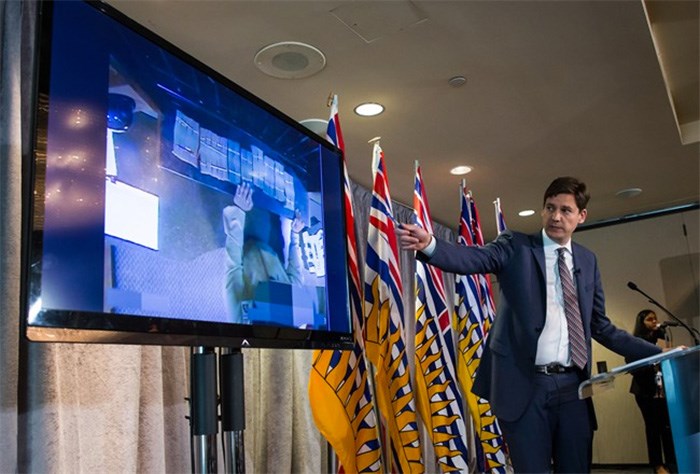 B.C. Attorney General David Eby gestures while showing a video of bundles of cash brought to a casino by a person, after releasing an independent review of anti-money laundering practices during a news conference in Vancouver, on Wednesday June 27, 2018. THE CANADIAN PRESS/Darryl Dyck
B.C. Attorney General David Eby gestures while showing a video of bundles of cash brought to a casino by a person, after releasing an independent review of anti-money laundering practices during a news conference in Vancouver, on Wednesday June 27, 2018. THE CANADIAN PRESS/Darryl Dyck
The B.C. government has released an independent report that says money laundering at Vancouver-area casinos fuelled the opioid crisis and the skyrocketing real-estate market. Here are five things from the "Dirty Money" report by former RCMP deputy commissioner Peter German.
— As early as 2012, some employees within both the Gaming Policy Enforcement Branch and the British Columbia Lottery Corp., recognized the reality that small-time loan sharking had evolved into large-scale money laundering.
— On July 22, 2015, an RCMP officer advised a BC Lottery Corp., investigator that police officers had been looking for a 'minnow' and found a 'whale.'
— Relationships between the BC Lottery Corp. and the Gambling Policy and Enforcement Branch were described as either strained or broken by interviewees, many of whom spoke about a culture of distrust.
— Chinese organized crime groups function like multinational corporations, using the transportation and business networks of southern China, Hong Kong and Macau to trade commodities such as methamphetimines, precursor chemicals and counterfeit goods.
— British Columbia's gaming legislation was updated in 2002 to remove politics from gaming: "Over the past two decades the trajectory of the gaming industry has been extraordinary, while the statute has remained static. The (act) does not mention money laundering."
![]()


